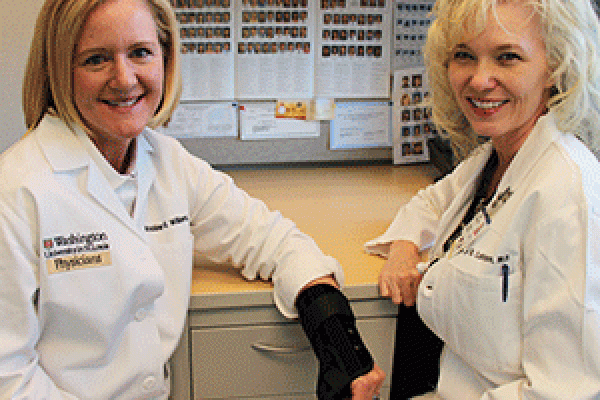Defects in brain cell migration linked to mental retardation
A rare, inherited form of mental retardation has led
scientists at the School of Medicine to
three important “travel agents” at work in the developing brain. The agents make it possible for brain neurons to travel
from where they are born to other brain regions where they will
permanently reside.
Antibiotics prevent some hospital UTIs
Urinary tract infections are among the most common infections acquired in hospitals, with most linked to the use of catheters. New research suggests that some urinary tract infections could be prevented if patients receive an antibiotic at the time they have a urinary catheter removed.
Laughing gas does not increase heart attacks
Nitrous oxide — best known as laughing gas — is one of the world’s oldest and most widely used anesthetics. Despite its popularity, however, experts have questioned its impact on the risk of a heart attack during surgery or soon afterward. But those fears are unfounded, a new study indicates.
Brunt earns Wolfson Outstanding Teacher Award
L. Michael Brunt, MD, professor of surgery in minimally invasive surgery at the School of Medicine, received a 2013 Philip J. Wolfson Outstanding Teacher Award at the annual meeting of the Association for Surgical Education, held April 25-27 in Orlando, Fla.
Mackinnon receives Jacobson Innovation Award
The School of Medicine’s Susan E. Mackinnon, MD, has received the 2013 Jacobson Innovation Award of the American College of Surgeons for her leadership in the innovative use of nerve-transfer procedures in the treatment of patients with devastating peripheral nerve injuries. Pictured is Mackinnon after receiving the award from A. Brent Eastman, MD, ACS president.
Splints favored for kids’ forearm buckle fractures
When children fall and try to catch themselves with an outstretched hand, they can suffer “buckle fractures,” forearm injuries traditionally treated with casts. But new research shows that removable splints are cpreferred by patients and parents, building on earlier findings that such splints are just as effective as casts. Shown are study co-authors Kristine G. Williams, MD, holding a splint, and Janet D. Luhmann, MD.
Kolovos, Barrack receive Life Saver Awards
The City of Clayton and the Clayton Fire Department awarded Life Saver Awards to Nikoleta Kolovos, MD, assistant professor of pediatrics, and Robert Barrack, MD, (shown) the Charles F. and Joanne Knight Distinguished Professor of Orthopedic Surgery.
Upcoming events focus on health-care disparities
Two events focused on disparities in health care will be held on the Washington University Medical Campus — a symposium June 15 and a fast-paced “Ignite” event July 11.
Deadly viruses focus of $18 million grant
In an effort to learn why some viruses such as influenza, Ebola and West Nile are so lethal, a team of U.S. researchers plans an $18.3 million comprehensive effort to model how humans respond to these viral pathogens. Participants include Washington University’s Michael Diamond, a West Nile expert.
National Bike to Work Day is May 17
Friday, May 17, is National Bike to Work Day. For nearly 20 years, School of Medicine faculty Laura Bierut and Brad Evanoff have been riding their bikes to work. Earlier this week, they rode their tandem bike to the Medical Campus. The two encourage others to ride their bikes to work, too.
View More Stories

